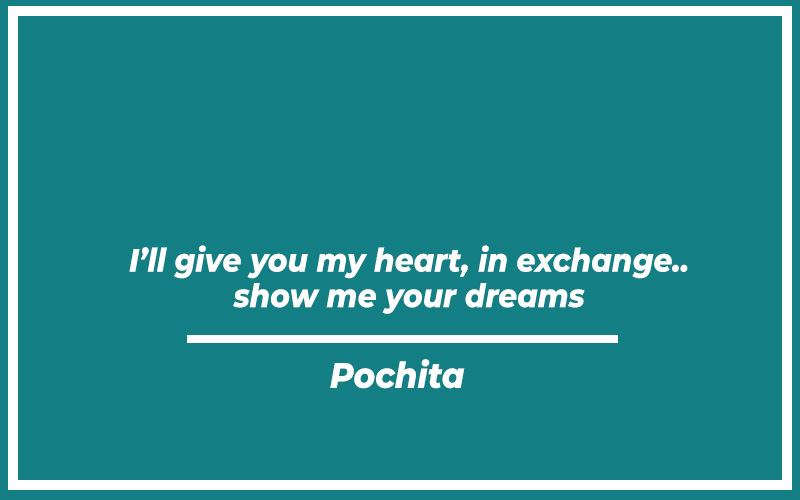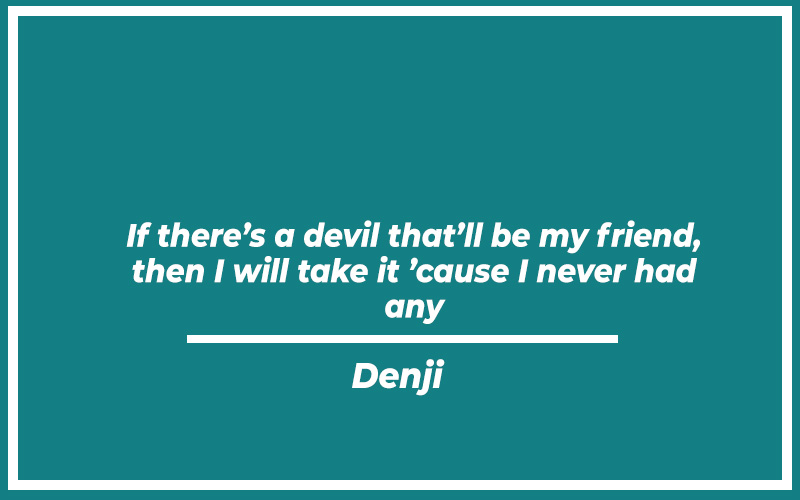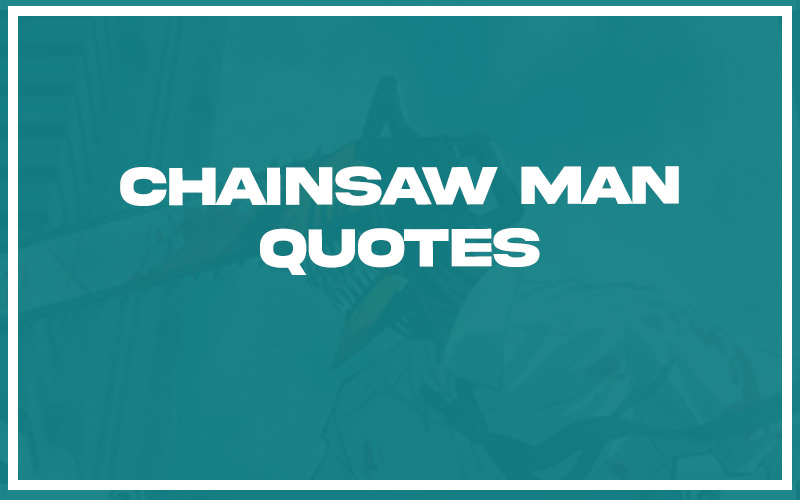Chainsaw Man is a dark action manga that follows Denji, a down-on-his-luck teenager who becomes a Devil Hunter after merging with a chainsaw devil.
The story is a brutal and bloody rollercoaster, but it’s also surprisingly funny and heartwarming at times. For some, Chainsaw Man is a thrilling adventure filled with over-the-top action. For others, it’s a commentary on social issues and the lengths people go to for basic needs.
Chainsaw Man teaches us that even in the worst situations, there’s always something worth fighting for, even if it’s just a decent meal or a warm place to sleep.
Best Chainsaw Man Quotes

I’ll give you my heart, in exchange.. show me your dreams.” – Pochita
Pochita’s quote underscores the theme of sacrifice and loyalty that runs deep in “Chainsaw Man.” By offering his heart to Denji, Pochita forms a bond that symbolizes unwavering support and a desire to see Denji’s dreams come to fruition. This selfless act highlights the depth of their relationship and sets the tone for Denji’s journey, driven by the dreams and sacrifices of those he holds dear.
Pochita’s words also reflect the series’ exploration of the importance of dreams and the lengths one might go to protect and nurture them.
Also Read: Blood Meridian Quotes (with Explanation)
“All devils are born with a name. The more that name is feared, the more powerful the devil itself.” – Makima
This Makima insight reveals the intrinsic link between fear and power in the world of “Chainsaw Man.” This concept drives much of the series’ tension and conflict, as characters navigate a landscape where names and reputations carry significant weight.
Makima’s understanding of this dynamic allows her to manipulate and control others effectively, demonstrating the strategic importance of fear in establishing dominance.
The quote also serves as a commentary on the nature of power and the psychological impact of fear, emphasizing how perceptions can shape reality.
“Maybe I became a devil hunter for a really shallow reason, but I’m willing to die to keep living like this.” – Denji
Denji’s candid admission reflects his complex motivations and the often blurred lines between self-interest and altruism in “Chainsaw Man.” His willingness to risk his life for the sake of his current existence underscores a deeper desire for stability and normalcy, even if his reasons for becoming a devil hunter initially seem superficial.
This quote encapsulates Denji’s growth and the evolving nature of his commitments, highlighting the personal sacrifices he is willing to make to protect the life he has built, no matter how imperfect it may be.
“The necessary evil you speak of, is just an excuse to justify the evil things you do. Society has no need for that excuse.” – Makima
Makima’s critique of “necessary evil” challenges the moral justifications often used to condone harmful actions. Her statement reflects a broader theme in “Chainsaw Man” that questions the ethical boundaries of power and authority.
By rejecting the notion of necessary evil, Makima exposes the hypocrisy and self-serving nature of such rationalizations, urging a more honest examination of motives and consequences. This quote serves as a powerful reminder of the potential for corruption when evil is normalized or deemed essential.
“Did I lose my humanity when I lost my heart?” – Denji
Denji’s introspective question highlights the central theme of humanity’s fragility and resilience in “Chainsaw Man.” As he grapples with his identity and the changes brought by his fusion with Pochita, Denji confronts the essence of what it means to be human.
This quote poignantly captures his inner turmoil and the existential questions that arise from his unique circumstances, reflecting the series’ exploration of identity, loss, and the search for meaning in a world where humanity and monstrosity often intersect.
“We’ll be working together until death do us apart.” – Makima
Makima’s declaration encapsulates the fatalistic bond that ties the characters in “Chainsaw Man.” Her words suggest a deep, inescapable connection that transcends ordinary partnerships, foreshadowing the intense and often destructive relationships that define the series.
This quote underscores the themes of loyalty, fate, and the sometimes grim reality of alliances formed in the shadow of death. Makima’s statement also hints at her manipulative nature, as she binds others to her will under the guise of camaraderie.
“I want you to live a normal life and die a normal death. Make my dreams come true for me!” – Denji
Denji’s plea reflects his yearning for normalcy and the simple joys of life, which stand in stark contrast to the chaotic and violent world he inhabits. This quote highlights his fundamental desires and the deep connections he forms with those he cares about.
By asking someone to live and die normally, Denji reveals his own struggles with achieving a semblance of normal life and his hope that others might find the peace and stability that elude him. This poignant request encapsulates the series’ exploration of dreams, aspirations, and the pursuit of a life worth living amidst turmoil.
“Life is short and uncertain. Live each day as if it’s your last.” – Denji
Denji’s reflection on the brevity and unpredictability of life serves as a poignant reminder to cherish each moment. In the chaotic world of “Chainsaw Man,” where death lurks around every corner, this quote encapsulates the urgency and intensity with which Denji approaches life. It underscores the series’ existential themes, emphasizing the importance of seizing the day and making the most of the present.
Denji’s words resonate with a universal truth, encouraging readers to live fully despite the uncertainty that defines existence.
“Enemies are enemies… we’re only using them. I have no intention of getting friendly with one.” – Aki Hayakawa
Aki’s pragmatic approach to dealing with enemies reflects his unwavering focus and dedication to his mission. This quote highlights the stark realities of the world in “Chainsaw Man,” where alliances are often formed out of necessity rather than trust.
Aki’s clear boundary between friend and foe underscores the harshness of his environment and his commitment to his goals. His words serve as a reminder of the dangers of becoming too comfortable or complacent in a world where betrayal and conflict are ever-present.
“I can only get along with cats. I hate humans! It’s just a devil’s instinctual sort of hatred.” – Power
Power’s declaration of her preference for cats over humans humorously yet pointedly illustrates her devilish nature. This quote encapsulates Power’s complex personality, blending her fierce independence with a touch of vulnerability.
Her instinctual hatred for humans contrasts sharply with her affection for her cat, Meowy, revealing the duality of her character. Power’s candidness and unapologetic embrace of her instincts make her a compelling and unpredictable figure within the series, adding depth to her interactions and relationships.
“I still wanna be Chainsaw Man. How can I kill Ms. Makima so I can do that?” – Denji
Denji’s determination to become Chainsaw Man, despite the daunting challenge of defeating Makima, showcases his resilience and ambition. This quote highlights his internal struggle and the complexity of his feelings toward Makima, blending admiration with a sense of betrayal.
Denji’s resolve to achieve his goal, even at great personal cost, underscores the series’ themes of perseverance and the pursuit of identity. His inner conflict adds depth to his character, making his journey both compelling and relatable.
“It must be nice having someone care enough to cry over you.” – Himeno
This Himeno wistful observation reflects her deep sense of loneliness and longing for genuine connection. In the brutal world of “Chainsaw Man,” her words resonate with a poignant truth about the human need for companionship and emotional support.
Himeno’s vulnerability and the weight of her experiences add a layer of melancholy to the series, highlighting the personal toll of constant danger and loss. Her longing for someone to care underscores the series’ exploration of the fragile and fleeting nature of human relationships.
“The time has come to pay for your sins. I investigated your past. A child’s mind is an amazing thing. They can just shut away memories they don’t like behind a door.” – Makima
Makima’s chilling insight into the human psyche underscores her manipulative and perceptive nature. This quote delves into the themes of guilt and repression, illustrating how past traumas and sins can be buried deep within the mind.
Makima’s ability to uncover and exploit these hidden memories reveals her formidable power and psychological acumen. Her words serve as a reminder of the dark secrets that characters carry and the profound impact these buried truths can have on their lives and actions.

“If there’s a devil that’ll be my friend, then I will take it ’cause I never had any.” – Denji
Denji’s candid admission of his loneliness and longing for friendship highlights the series’ exploration of human connection and isolation. His willingness to accept a devil as a friend underscores the desperation and yearning for companionship that drives much of his actions.
This quote encapsulates Denji’s vulnerability and the poignant reality of his life, where genuine relationships are scarce and hard-won. His openness about his need for friends adds depth to his character, making his journey toward finding meaningful connections all the more compelling.
“Of all the women I know! Every single one of them tried to kill me!” – Denji
Denji’s exaggerated lament underscores his tumultuous relationships and the recurring theme of betrayal in “Chainsaw Man.” His experience reflects the series’ dark humor and the dangers inherent in his world, where trust is a rare commodity.
Denji’s words highlight his cynical outlook, shaped by repeated betrayals, yet also capture the absurdity and unpredictability of his interactions with women. This quote adds a layer of levity to the otherwise grim narrative, showcasing Denji’s resilience and his ability to find humor amidst chaos.
“If I can kill the guy I want to kill then I don’t care what happens next.” – Aki Hayakawa
Aki’s quote reveals his singular focus on vengeance, a driving force that shapes his actions and decisions. This intense desire for retribution against the Gun Devil underscores his character’s depth and the personal stakes involved in his mission.
Aki’s willingness to face any consequence to achieve his goal highlights the themes of sacrifice and obsession that permeate “Chainsaw Man.” His relentless pursuit of justice adds a tragic dimension to his character, emphasizing the emotional and moral complexities within the series.
“Hey, Hey, Hey! Grovel, Human!! My name is Power!” – Power
Power’s bombastic introduction exemplifies her over-the-top personality and desire for dominance. Her demand for others to grovel highlights her devilish arrogance and playful cruelty. This quote captures the essence of Power’s character – confident, unapologetically self-centered, and always eager to assert her superiority.
Her larger-than-life attitude and humorous bravado provide comic relief in the series, while also showcasing the unpredictable nature of devils in the world of “Chainsaw Man.”
“You know, the devil hunters that devils are scared of are the ones with the most screws loose.” – Kishibe
Kishibe’s blunt observation reflects the brutal reality of devil hunting and the psychological toll it takes on those who pursue it. His comment suggests that only those who embrace their madness can truly excel in this dangerous profession.
This quote highlights Kishibe’s pragmatic and unflinching perspective, underscoring the themes of insanity and survival in “Chainsaw Man.” Kishibe’s insight adds depth to his character, portraying him as a seasoned veteran who understands the harsh truths of their world.
“It’s not that you’re fearless; you simply lack the intelligence to fully comprehend the implications…can you imagine living your life constantly stalked by death?” – Santa Claus
Santa Claus’ chilling remark to Denji underscores the existential dread that permeates “Chainsaw Man.” Her words highlight the constant threat of death that characters face, revealing the psychological impact of their perilous lives.
This quote emphasizes the themes of fear and mortality, illustrating the thin line between bravery and ignorance. Santa Claus’ menacing presence and strategic mind add a layer of tension and complexity to the narrative, making her a memorable antagonist.
“Only answer with ‘Yes’ or ‘Woof.’ I don’t need a dog who says ‘No.'” – Makima
Makima’s dehumanizing command to Denji reflects her manipulative and domineering nature. This quote captures the power dynamics at play in their relationship, with Makima asserting control over Denji in a manner that strips him of his autonomy. Her cold and calculating demeanor underscores the themes of control and subjugation, highlighting the psychological manipulation she employs.
Makima’s authoritative presence and the fear she instills in others are central to her role as a formidable antagonist in “Chainsaw Man.”
“Human! Hurry up and let me kill something! I thirst for blood!” – Power
Power’s aggressive and bloodthirsty declaration encapsulates her chaotic and violent nature. This quote highlights her insatiable desire for combat and destruction, reflecting the primal instincts that drive her as a devil. Power’s unrestrained enthusiasm for violence adds to her unpredictability and makes her a compelling and dangerous character.
Her raw, unfiltered expression of her desires underscores the darker, more visceral aspects of “Chainsaw Man,” where the boundary between humanity and monstrosity is constantly blurred.
“I’ve had enough of watching people die in front of my eyes.” – Aki Hayakawa
Aki’s somber declaration reveals the emotional toll that his life as a devil hunter has taken on him. This quote underscores the themes of loss and trauma that permeate “Chainsaw Man.” Aki’s weariness reflects the cumulative impact of witnessing countless deaths, emphasizing the psychological burden carried by those who fight devils.
His determination to protect others, despite the personal cost, adds depth to his character and highlights the series’ exploration of the human spirit’s resilience in the face of relentless adversity.
“The one who killed my family and the one who killed my buddy are still alive. So what would I be quitting for?” – Aki Hayakawa
Aki’s words reveal his unyielding resolve and deep-seated desire for vengeance. This quote highlights his commitment to avenging his loved ones, driving his actions and motivations throughout the series.
Aki’s determination to continue fighting despite the risks underscores the themes of perseverance and justice in “Chainsaw Man.” His personal vendetta adds a layer of complexity to his character, illustrating how grief and anger can fuel one’s resolve and shape their destiny.
“It’s so great having an addiction. In this life, you need something to take the edge off.” – Himeno
Himeno’s candid remark about addiction reflects her coping mechanism for dealing with the harsh realities of her profession. This quote underscores the themes of escapism and the human need for relief from constant stress and trauma.
Himeno’s acknowledgment of her dependence on vices to manage her pain adds a layer of vulnerability to her character, highlighting the psychological impact of life as a devil hunter. Her words resonate with the broader narrative’s exploration of coping strategies and the struggle to maintain sanity amidst chaos.
“You know, the devil hunters that devils are scared of are the ones with the most screws loose.” – Kishibe
Kishibe’s blunt assessment of effective devil hunters underscores the necessity of embracing one’s inner chaos to survive in their world. This quote highlights the themes of insanity and unpredictability, suggesting that those who thrive in this dangerous profession often possess a degree of madness.
Kishibe’s words add depth to his character, portraying him as a seasoned veteran who understands the complexities of fighting devils. His insight reflects the broader narrative’s exploration of the fine line between sanity and madness in high-stress environments.
“Power is not about control, but about liberation.” – Power
Power’s reflection on the nature of power itself reveals her nuanced understanding of strength and freedom. This quote encapsulates the themes of autonomy and self-realization in “Chainsaw Man.” By viewing power as a means of liberation rather than control, Power challenges conventional notions of authority and dominance.
Her perspective adds depth to her character, highlighting her desire for true freedom and the ability to forge her own path. This insight resonates with the series’ broader exploration of power dynamics and individual agency.

“To understand power, you must first understand yourself.” – Power
Power’s introspective statement emphasizes the importance of self-awareness in wielding power effectively. This quote underscores the themes of identity and self-discovery in “Chainsaw Man.” By linking power to self-understanding, Power suggests that true strength comes from within and requires a deep comprehension of one’s own nature and motivations.
Her words add a philosophical dimension to her character, reflecting the series’ exploration of personal growth and the journey toward self-empowerment. This insight resonates with the narrative’s focus on the complexities of power and its impact on individuals.
Also Read: Sadhguru Quotes (with Explanations)
Final Thoughts
These Chainsaw Man quotes are like Denji himself – messy, funny, and surprisingly profound. If you’re a fan of this Manga, you’re probably already aware of this.
And if you’re planning on reading this, get ready for a ride through a world where nothing is sugar-coated, but humanity claws its way through the gore anyway.

